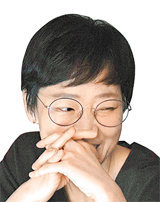Time of illiteracy
Time of illiteracy
Posted June. 14, 2021 07:28,
Updated June. 14, 2021 07:28


Language and thought constantly change over time. A new way of speaking automatically translates into a new thinking system. I have experienced this change over 18 years in France since I left my home country at the age of 21. There is a difference in how my thinking system works between when I speak Korean and when I use a foreign language.
I describe a foreign language that rules my words and thoughts as a language that exists outside my mother tongue. As it collides with my first language, my thinking ability slows down to limit me to saying not what I want to speak but what I am able to express. Due to the foreign language, I have ended up being someone who cannot be part of anywhere.
Hungarian author Agota Kristof had to leave her motherland to defect to Switzerland. Working at a watch factory in Neufchatel, she learned French to write not in her mother language but the foreign language. A single sentence is written fluently and ceaselessly to contain the unfortunate moments of history & an individual and a wider viewpoint of a long lifetime of the person and her great achievements. Such a naturally written language sometimes comes across as a savage result.
People who make it despite something difficult are not winners who defeat preceding conditions that may hold them back, but believers with a firm faith that they will never lose. Based on such a strongly rooted belief in their mind, they should fill in a long period of time with their clumsy sentences devised hesitantly. Desires for speaking may weaken due to a not-yet-skilled language. Words go without any frills to deliver the essence. Belief gets firm over the time of illiteracy. To me, Kristof and her pieces are not dreamy results but strong beliefs. As Kristof says, I believe that I am supposed to maintain faith in what I write and keep going with persistence and grits. I recall my exterior language and write with a strong belief. The act of writing does not require the past tense nor the future tense.
Headline News
- Joint investigation headquarters asks Yoon to appear at the investigation office
- KDIC colonel: Cable ties and hoods to control NEC staff were prepared
- Results of real estate development diverged by accessibility to Gangnam
- New budget proposal reflecting Trump’s demand rejected
- Son Heung-min scores winning corner kick







